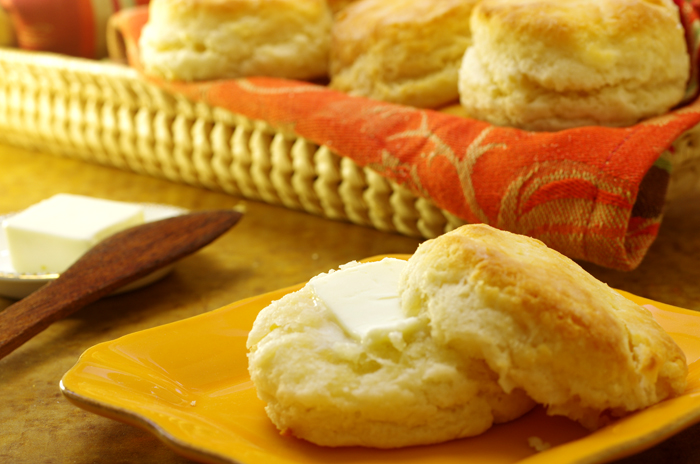Baking Powder Biscuits
Makes 18 (2-inch) biscuits
Click here for a printable version of the recipe.
This is the standard biscuit of most regions in the country. The difference here is that Southern all-purpose flour has less gluten. If using a national brand, start with just 1-3/4 cups of flour, or make a mix of half cake flour and half national-brand all-purpose flour. It has more fat than a humble biscuit, providing more flakiness and flavor. If a more crumbly biscuit is desired, increase the shortening to 3/4 cup.
2-1/4 cups all-purpose flour, divided
1 tablespoon baking powder
1 teaspoon salt
1/4 cup chilled shortening, lard, and/or butter, roughly cut into 1/4-inch pieces
AND
1/4 cup chilled shortening, lard, and/or butter, roughly cut into 1/2-inch pieces
1 cup milk or buttermilk, divided
Butter, softened or melted for finishing
Preheat oven to 425 degrees F.
Select the baking pan by determining if a soft or crisp exterior is desired. For a soft exterior, use an 8- or 9-inch cake pan, pizza pan, or ovenproof skillet where the biscuits will nestle together snugly, creating the soft exterior while baking. For a crisp exterior, select a baking sheet or other baking pan where the biscuits can be placed wider apart, allowing air to circulate and creating a crisper exterior, and brush the pan with butter.
Fork-sift or whisk 2 cups of flour, the baking powder, and the salt in a large bowl, preferably wider than it is deep, and set aside the remaining 1/4 cup of flour. Scatter the 1/4-inch-size pieces of chilled fat over the flour and work in by rubbing fingers with the fat and flour as if snapping thumb and fingers together (or use two forks or knives, or a pastry cutter) until the mixture looks like well-crumbled feta cheese. Scatter the 1/2-inch-size pieces of chilled fat over the flour mixture and continue snapping thumb and fingers together until no pieces remain larger than a pea. Shake the bowl occasionally to allow the larger pieces of fat to bounce to the top of the flour, revealing the largest lumps that still need rubbing. If this method took longer than 5 minutes, place the bowl in the refrigerator for 5 minutes to rechill the fat.
Make a deep hollow in the center of the flour with the back of your hand. Pour 3/4 cup of the milk into the hollow, reserving 1/4 cup milk, and stir with a rubber spatula or large metal spoon, using broad circular strokes to quickly pull the flour into the milk Mix just until the dry ingredients are moistened and the sticky dough begins to pull away from the sides of the bowl. If there is some flour remaining on the bottom and sides of the bowl, stir in 1 to 4 tablespoons of reserved milk, just enough to incorporate the remaining flour into the shaggy wettish dough. If the dough is too wet, use more flour when shaping
Lightly sprinkle a board or other clean surface using some of the reserved flour. Turn the dough out onto the board and sprinkle the top lightly with flour. With floured hands, fold the dough in half, and pat dough out into a 1/3- to 1/2-inch-thick round, using a little additional flour only if needed. Flour again if necessary, and fold the dough in half a second time. If the dough is still clumpy, pat and fold a third time. Pat dough out into a 1/2-inch thick round for a normal biscuit, 3/4-inch-thick for a tall biscuit, and 1-inch-thick for a giant biscuit. Brush off any visible flour from the top. For each biscuit, dip a 2-1/2-inch biscuit cutter into the reserved flour and cut out the biscuits, starting at the outside edge and cutting very close together, being careful not to twist the cutter. The scraps may be combined to make additional biscuits, although these scraps make tougher biscuits.
Using a metal spatula if necessary, move the biscuits to the pan or baking sheet. Bake the biscuits on the top rack of the oven for a total of 10 to 14 minutes until light golden brown. After 6 minutes, rotate the pan in the oven so that the front of the pan is now turned to the back, and check to see if the bottoms are browning too quickly. If so, slide another baking pan underneath to add insulation and retard browning. Continue baking another 4 to 8 minutes until the biscuits are light golden brown. When the biscuits are done, remove from the oven and lightly brush the tops with butter. Turn the biscuits out upside down on a plate to cool slightly. Serve hot, right side up.
|
|
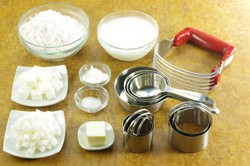
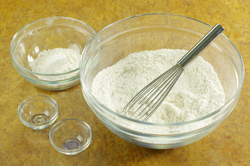
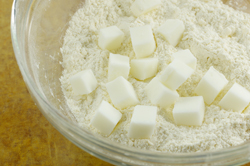
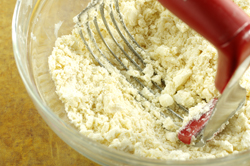
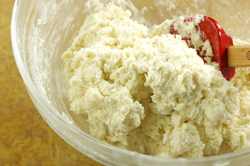
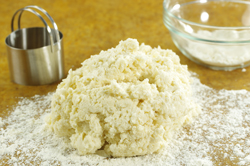
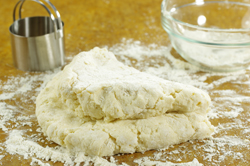
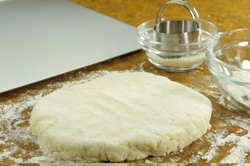
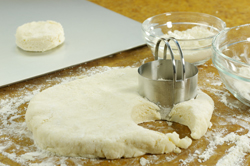
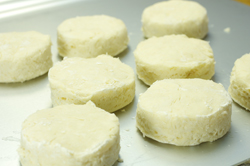
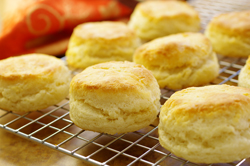
|


